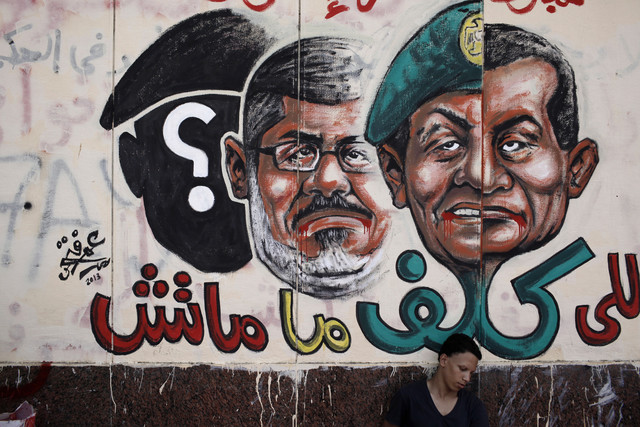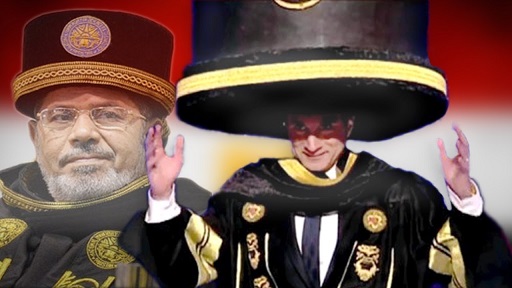 Mohamed Morsi will be more remembered in Canada and the US (if at all) as a textbook case of how the internet can catapult someone to fame and just as easily destroy him.
Mohamed Morsi will be more remembered in Canada and the US (if at all) as a textbook case of how the internet can catapult someone to fame and just as easily destroy him.
The Muslim Brotherhood benefited from a revolution largely facilitated by social media, which was able to catalyze widespread anger with Hosni Mubarak in January 2011, and gave the Egyptian army the chance to dismiss a dictator who was despised by all. Once the logjam was broken, transparent elections catapulted the MB to power.
But the internet is a fickle taskmaster. It was Egyptian doctor Bassem Youssef who used YouTube to launch  El-Bernameg, a satirical show which spoofed politicians in a way unprecedented in Egyptian history. El-Bernameg ran from 2011 to 2013, uncensored despite its increasingly ad hominem attacks on Egypt's first democratically elected president, Mohammad Morsi, promoting the opposition's distorted exaggerations of actual events, claiming that Morsi was becoming a dictator.
El-Bernameg, a satirical show which spoofed politicians in a way unprecedented in Egyptian history. El-Bernameg ran from 2011 to 2013, uncensored despite its increasingly ad hominem attacks on Egypt's first democratically elected president, Mohammad Morsi, promoting the opposition's distorted exaggerations of actual events, claiming that Morsi was becoming a dictator.
 Any Canadian or American interested in Egypt watched Youssef skewer Egypt's Islamists, learning nothing, but titillated in the cynical style of western politics. The most famous media byte was Morsi looking silly in a ceremonial hat.
Any Canadian or American interested in Egypt watched Youssef skewer Egypt's Islamists, learning nothing, but titillated in the cynical style of western politics. The most famous media byte was Morsi looking silly in a ceremonial hat.
As the campaign of subversion intensified on all fronts, Youssef (dubbed the Jon Stewart of the Arab world) let his program, fresh from witnessing the overthrow of a real dictator (Mubarak), set the stage for el-Sisi’s coup in 2013.
In June 2012, American satirist Jon Stewart invited Youssef to The Daily Show in New York. Youssef recorded one of the highest viewership ratings in the world on both TV and internet, with 40 million viewers on TV and more than 184 million combined views for his show on YouTube alone. He was a political power created by social media, the biggest Egyptian star in the West since Omar Sharif.
In 2013, Youssef was named one of the "100 most influential people in the world" by Time magazine and one of Foreign Policy magazine's 100 Leading Global Thinkers. In November 2013, he was awarded the International Press Freedom Award by the Committee to Protect Journalists. The blunt of his shallow humour, Morsi, was on death row, along with the other MB leaders.
As thousands were killed, tortured, left in prison limbo, Youssef fled Cairo, and in the venerable tradition of pro-US dissidents, was given an appointment at Harvard's Institute for Politics. Youssef and his family now living happily (?) in ‘the Bay Area’ (San Francisco). In an adulatory documentary Tickling Giants (2017), he is clearly shaken but insists (feebly) that "If I could it do to again, I would do the same."
A journalist with al-Ahram Weekly, I watched Youssef on TV before I myself fled the growing nightmare of Cairo in 2012, but he didn't really register with me. He was manipulating the audience and his targets with no purpose. Humour in another language is always difficult, and here was a petulant stand-up comedian mocking politics, attacking personal foibles, actually diverting the listener from serious political issues. Meanwhile, Egypt descended into chaos and experienced a collective mental breakdown. Youssef's humour looks maudlin in retrospect.
This American-style humour is poisonous in a troubled Muslim society lacking democratic foundations, a doctor using his cold-blooded skills to inject Egypt with US cultural poison. He handed Morsi's head to Sisi, though Sisi hesitated, leaving Morsi languishing, sick and dying. How convenient that he just gave up the ghost.
Human Rights Watch official Sarah Leah Whitson said Morsi’s treatment in prison was “horrific, and those responsible should be investigated and appropriately prosecuted.” The United Nations High Commissioner for Human Rights, called June 18 for a “prompt, impartial, thorough and transparent investigation” into Morsi’s death. The Toronto Star highlighted the goulish last minutes, Morsi in a glass cage blinded by bright, garrish light, disoriented, collapsing.
Such a vision makes for powerful theatre, but has little effect on the official level. There will be some tut-tutting, but as with bin Salman's much clearer guilt in killing foe Jamal Khashoggi, there will be few consequences. Geopolitical concerns will keep Sisi safe. Among non-muslim Canadians, Morsi will be forgotten as just a failed (thank god) Islamist, in the tradition of bin Laden or al-Baghdadi.
But Canada has 67,000 Egyptians. Virtually none approve of what has happened after the coup. Morsi himself is a divisive figure, despised by secularists, supported by devout Muslims. Former MB adviser Wael Haddara, professor of medicine at Western University, London, Ontario, said his death was not a surprise. “We had been expecting the worst for some time. ... There were many failures during the year Morsi was in office, but also many successes. The former have been amplified by many, the latter muted." @waelhaddara
But while anti-Morsi/MB sentiment is fine, pro-MB sentiment among the Egyptian Canadian community is targeted by both Canadian and Egyptian security.
A current victim of the anti-MB hysteria in Egypt is Yasser Ahmed Albaz, who runs an engineering firm in  Oakville, Ontario. He was about to board a plane on his way back to Canada in February 2019 when he was “flagged”, arrested and transported to Tora prison, described by Human Rights Watch as “the central site for those deemed enemies of the state.”
Oakville, Ontario. He was about to board a plane on his way back to Canada in February 2019 when he was “flagged”, arrested and transported to Tora prison, described by Human Rights Watch as “the central site for those deemed enemies of the state.”
Albaz's daughter Amal Ahmed Albaz said, “My father has no political affiliations,” but the strong antipathy to el-Sisi in Canada is surely being noted in Cairo. The likely scenario is that someone informed the Mukhabarat that Albaz was speaking out too loudly about Egyptian 'justice'. His arrest sent a chill through the Egyptian Canadian community.





